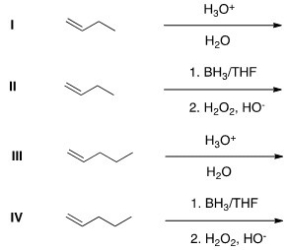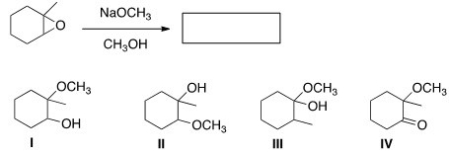Exam 9: Alcohols,ethers,and Related Compounds
Exam 1: Structure and Bonding77 Questions
Exam 2: Acids and Bases59 Questions
Exam 3: Introduction to Organic Molecules and Functional Groups56 Questions
Exam 4: Alkanes64 Questions
Exam 5: Stereochemistry76 Questions
Exam 6: Understanding Organic Reactions53 Questions
Exam 7: Alkyl Halides and Nucleophilic Substitution73 Questions
Exam 8: Alkyl Halides and Elimination Reactions52 Questions
Exam 9: Alcohols,ethers,and Related Compounds60 Questions
Exam 10: Alkenes and Addition Reactions54 Questions
Exam 11: Alkynes and Synthesis51 Questions
Exam 12: Oxidation and Reduction51 Questions
Exam 13: Radical Reactions51 Questions
Exam 14: Conjugation, resonance, and Dienes53 Questions
Exam 15: Benzene and Aromatic Compounds47 Questions
Exam 16: Reactions of Aromatic Compounds60 Questions
Exam 17: Introduction to Carbonyl Chemistry; Organometallic Reagents; Oxidation and Reduction59 Questions
Exam 18: Aldehydes and Ketones - Nucleophilic Addition52 Questions
Exam 19: Carboxylic Acids and the Acidity of the O-H Bond53 Questions
Exam 20: Carboxylic Acids and Their Derivatives - Nucleophilic Acyl Substitution50 Questions
Exam 21: Substitution Reactions of Carbonyl Compounds at the a Carbon47 Questions
Exam 22: Carbonyl Condensation Reactions51 Questions
Exam 23: Amines65 Questions
Exam 24: Carbon-Carbon Bond-Forming Reactions in Organic Synthesis47 Questions
Exam 25: Pericyclic Reactions62 Questions
Exam 26: Carbohydrates50 Questions
Exam 27: Amino Acids and Proteins46 Questions
Exam 28: Synthetic Polymers45 Questions
Exam 29: Lipids45 Questions
Exam 30: Molecular Ion Peaks and Fragmentation Patterns19 Questions
Exam 31: Analyzing Molecular Motion and Infrared Spectroscopy37 Questions
Exam 32: Organic Spectroscopy Concepts51 Questions
Select questions type
Which of the following statements about a crown ether-cation complex is not true?
Free
(Multiple Choice)
4.9/5  (33)
(33)
Correct Answer:
B
Which of the following compounds is (are)symmetrical ethers? 
Free
(Multiple Choice)
4.9/5  (26)
(26)
Correct Answer:
B
Which of the following would be a reasonable synthesis of 2-butanol? 
Free
(Multiple Choice)
4.8/5  (38)
(38)
Correct Answer:
A
What is the major organic product(s)obtained in the following reaction? 
(Multiple Choice)
4.9/5  (34)
(34)
Rank the alcohols in order of increasing reactivity when dehydrated with H2SO4,putting the least reactive first. 
(Multiple Choice)
4.8/5  (36)
(36)
Which of the following compounds has the highest boiling point? 
(Multiple Choice)
4.9/5  (40)
(40)
Determine the product in the following reaction (ignoring possible stereoisomers). 
(Multiple Choice)
4.8/5  (41)
(41)
Which of the following alcohols is most likely to yield a carbocation that is susceptible to rearrangements? 
(Multiple Choice)
4.8/5  (38)
(38)
Which of the following reactions will provide the best yield of ether by the Williamson ether synthesis?
(Multiple Choice)
4.8/5  (38)
(38)
Which of the following reactions will provide the best yield of ether by the Williamson ether synthesis?
(Multiple Choice)
4.9/5  (28)
(28)
What is the major alkene formed when compound A is dehydrated with H2SO4? 
(Multiple Choice)
4.9/5  (23)
(23)
Showing 1 - 20 of 60
Filters
- Essay(0)
- Multiple Choice(0)
- Short Answer(0)
- True False(0)
- Matching(0)